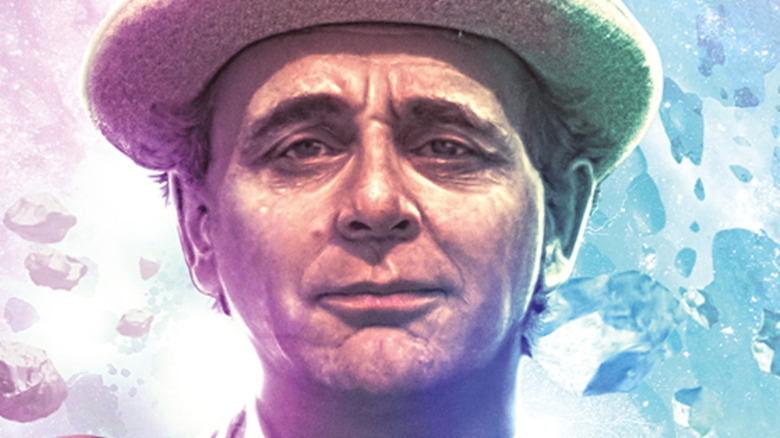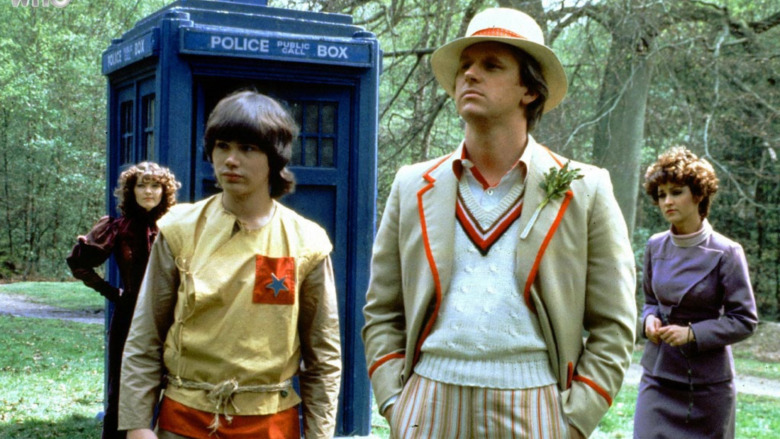Why Did Doctor Who End The First Time Around?
Fans of Christopher Eccleston's turn as the Ninth Doctor on "Doctor Who" got some exciting news when it was announced that the actor would be returning to the character through audio form. According to SyFy, Eccleston is featured in the Big Finish produced "Doctor Who Adventures: Ravagers" which is due for release in May 2021. It's also the only time fans will ever get to see the actor return as his version of the Time Lord, as he told in an interview with Lorraine Kelly during her self-titled breakfast show that he'd only return to television as the character when "Hell freezes over."
There are numerous reasons as to why some fans fondly hold Eccleston's single-season run as the Doctor in high regards, but perhaps the biggest one is the fact that he's the actor who brought the Time Lord back to the small screen after a 16-year hiatus. "Doctor Who" began way back in 1963, kicking off with William Hartnell as the First Doctor until Season 4, which ran from 1966 to 1967. Season 4 also introduced the Second Doctor, Patrick Troughton, and by Season 7 in 1970, Jon Pertwee's Third Doctor had shown up. Tom Baker served as the Fourth Doctor from 1974 (first appearing as a guest in Season 11) all the way to Season 18 in 1981. Between Season 19 in 1982 and the "Doctor Who" movie in 1996, fans met the Fifth through Eighth Doctors: Peter Davison, Colin Baker, Sylvester McCoy, and Paul McGann.
But "Doctor Who" stopped airing long before the mid-90s movie premiered. BBC One gave up on the iconic series after its 26th season in 1989, and it would be over a decade and a half before anyone saw the series on television again. Why did "Doctor Who" get canceled the first time around? Let's discuss.
BBC One executives weren't fans of Doctor Who, and the 1980s were a rough time for the Doctor
The relationship between "Doctor Who" and the BBC One was obviously a fruitful one, as the show ran for 653 episodes across 23 years before being put on ice in 1989. It seems that fans can blame "Doctor Who" going on an extended hiatus on the actions of BBC One executives Peter Cregreen, Jonathan Powell, and Michael Grade, who weren't fans of the series. Grade in particular hated "Doctor Who," and wasn't shy about expressing his distaste. Speaking to The Evening Standard in July 2020, Grade said, "I hated 'Doctor Who.' I said to the producer, 'Do you go to the cinema much? Have you seen 'Star Wars' or 'E.T.'?' He said yes. I said, 'I've got news for you so has our audience. What we were serving up as science fiction was garbage.'"
In 1985, Grade, who was the controller of BBC One at the time, took "Doctor Who" off air. He later admitted in a 2005 interview that "all [he] did was try to kill ['Doctor Who'] while it was at the BBC." Grade said he felt the show was "horrid," "so outdated," "awful," and "very violent." The series returned 18 months later — and it may be worth noting that when "Doctor Who" reemerged in 2005, Grade watched the first episode and said it was "tremendous."
Sadly, fans weren't always happy with "Doctor Who" in the '80s either. Colin Baker's Sixth Doctor was then (and continues to be) widely considered one of the most unlikeable versions of the character due to his negative personality, and the infamous scene where he chokes his companion Peri (Nicola Bryant) understandably caused a lot of commotion. Baker's time as the Doctor was halted when the show went on hiatus, and it's been reported that Grade agreed to bring the series back on the condition that Baker wouldn't return. Sylvester McCoy wound up replacing him as the Seventh Doctor.
By that time, however, "Doctor Who" had moved to Monday nights — the same night the popular British soap opera "Coronation Street" was airing. Fans also took their time to warm up to McCoy's Doctor, which hurt the show's ratings even more. It was enough justification for the powers that be to drop "Doctor Who" from BBC One in 1989.

